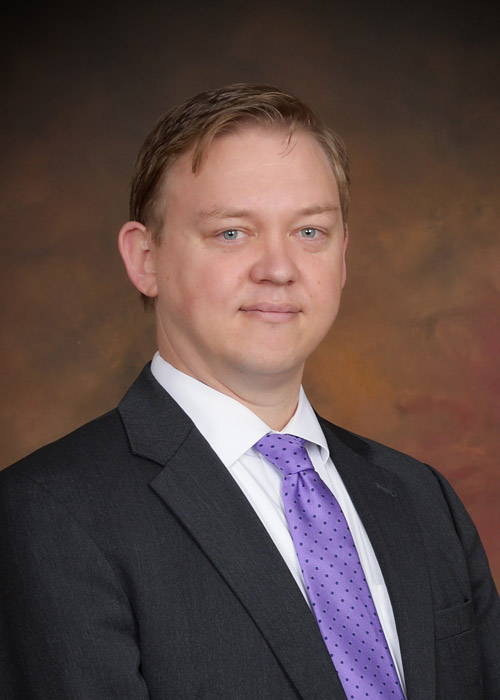UTD Spinoff Company’s Sale Takes 3D Printing to Scale
By: Kim Horner | June 23, 2021

The recent sale of The University of Texas at Dallas spinoff company Adaptive3D paves the way for large-scale manufacturing of 3D-printed specialized plastic and rubber materials developed at the University.
Adaptive3D was acquired by Desktop Metal Inc., an industry leader in additive manufacturing based in Burlington, Massachusetts, in a deal announced in May.
Dr. Walter Voit BS’05, MS’06, associate professor of materials science and engineering and mechanical engineering in the Erik Jonsson School of Engineering and Computer Science, started Adaptive3D’s precursor company, Syzygy Memory Plastics, in 2007 as a doctoral student at the Georgia Institute of Technology. When Voit joined UT Dallas in 2010, the company became one of the first to launch at the University’s Venture Development Center.
“We are thrilled to partner with Desktop Metal to enable additive manufacturing through our differentiated materials,” said Voit, founder and CEO of Adaptive3D. The company will become a subsidiary of Desktop Metal, and Voit will continue to serve as CEO and as a UT Dallas faculty member.

Through his research at the University and at Adaptive3D, Voit has developed specialized plastic and rubber materials using 3D printing rather than the traditional method of making products by injecting plastic material into a mold. With 3D printing, or additive manufacturing, products are built layer by layer in preprogrammed shapes. Adaptive3D manufactures specialized plastic and rubber materials for products ranging from shoes to parts for airplanes.
Ric Fulop, founder and CEO of Desktop Metal, said the acquisition advances Desktop Metal’s strategy to expand its portfolio of materials.
“Adaptive3D has the best photo elastomer resins in the world,” Fulop said. He said the acquisition will “accelerate the adoption of additively manufactured solutions for high-volume, end-use elastomeric parts and products.”
The sale of Adaptive3D is the result of more than a decade of research and business development. Voit received support for his UT Dallas research from the Defense Advanced Research Projects Agency, the National Science Foundation, the National Institutes of Health and Texas Instruments Inc.
Voit said support from the family of UT Dallas co-founder Eugene McDermott was critical to his success.
“This wouldn’t have been possible without the generous support and early investment from the McDermott family,” said Voit, who arrived at UT Dallas as an undergraduate and was one of the inaugural Eugene McDermott Scholars. “Margaret McDermott was one of the pioneering philanthropic investors in our time in Dallas and all over the world, and I’m just so humbled and fortunate to have been one of her friends in the later years of her life. She paid for the scholarship that brought me to UT Dallas in the first place.”
“Just as important as this short-term return, the long-term return on investment to the University is the impact it provides by delivering on our promises — promises to our students and researchers that we will equip them with the resources to succeed in entrepreneurship, and our promise to North Texas that we will be an engine of investment, jobs and business revenues coming into our region.”
Steve Guengerich, associate vice president for innovation and commercialization at UT Dallas
Voit said he also is thankful for support from the University, which he said “set up the DNA for entrepreneurship at UT Dallas to be successful.” The Venture Development Center provided office and lab space to Adaptive3D for several years, while the Office of Research and the Office of Technology Commercialization offered guidance on intellectual property and licensing to make sure the company’s inventions were protected.
Expanding entrepreneurship and commercialization programs are a key part of the economic engine initiative in the University’s Strategic Plan.
“As a stakeholder in Adaptive3D — given the UT System’s ownership of key intellectual property developed by University employees in our labs — UT Dallas will enjoy a financial return on the acquisition, along with the company’s other investors and owners,” said Steve Guengerich, associate vice president for innovation and commercialization.
“But, just as important as this short-term return, the long-term return on investment to the University is the impact it provides by delivering on our promises — promises to our students and researchers that we will equip them with the resources to succeed in entrepreneurship, and our promise to North Texas that we will be an engine of investment, jobs and business revenues coming into our region,” he said.
Media Contact:
Kim Horner, UT Dallas, 972-883-4463, kim.horner@utdallas.edu, or the Office of Media Relations, UT Dallas, (972) 883-2155, newscenter@utdallas.edu.





